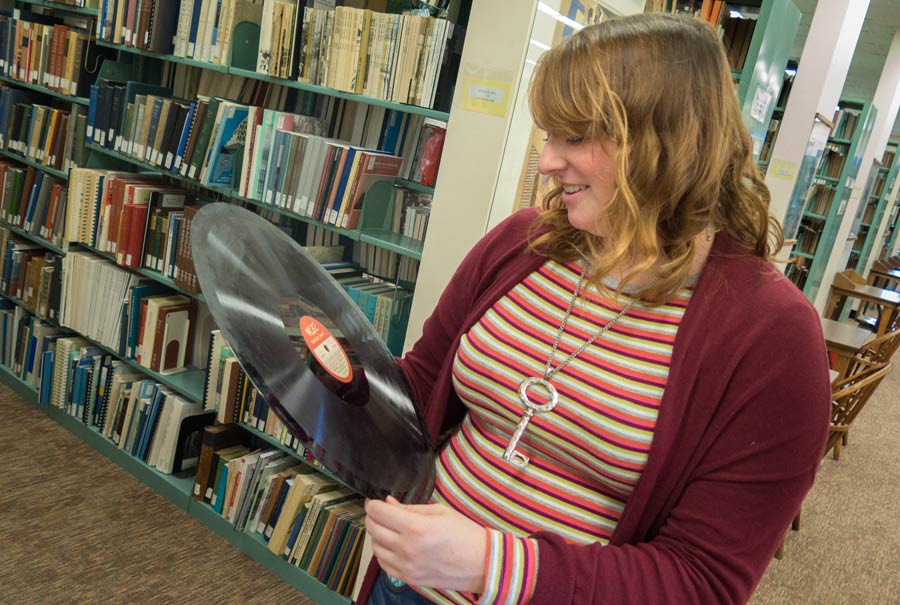
Listening to Local History
A UMaine student brings 1940s radio to the digital age
By her own account, Delaney Fitzpatrick didn’t know what to expect when she came to Fogler Library to find an internship. As a sophomore at the time, Fitzpatrick had trouble finding the right opportunity. When her adviser, UMaine Professor of History
Dr. Micah Pawling, told her about an opening to work in Special Collections at the library, she knew she had to take action.
“I had absolutely no idea what I was going to be doing,” says Fitzpatrick. Even without knowing the specifics of the work, Fitzpatrick was certain the experience would benefit her. “Internships normally don’t just plop themselves in front of you just like that, so I took it as a sign and grabbed it before it was taken away.”
After meeting with Dr. Nathan Godfried, a professor who specializes in 20th century broadcast history, and Special Collections Archivist Desiree Butterfield-Nagy, Fitzpatrick had ironed out the details of her assignment. She spent the next few months listening to dozens of hours of audio recordings. She listened to local sports broadcasts, weather reports, and advertisements from General Electric. She listened to opera renditions and discussions with elementary school teachers. She listened to the awards ceremony honoring responders during the Bar Harbor Fire of 1947. She listened to interviews with Senator Joseph McCarthy.
These recordings and hundreds of others are part of a collection from WLBZ Radio broadcasts throughout the 1940s. The collection of recordings contains everything one would expect to find on local radio broadcasts: high school sports coverage, commercial breaks, hundreds of sound effects. The records came to Fogler Library through Barry Darling, a former WLBZ station manager who also volunteers in Special Collections.
For her internship, Fitzpatrick spent the summer transcribing, cataloguing, and uploading the recordings to the University of Maine’s Digital Commons, an open-access, online repository.
“The WLBZ collection came to mind as something that would be a good fit when I learned that Delaney was a history major and had a background in journalism,” explains Butterfield-Nagy, who supervised Fitzpatrick. “We try to find projects that are a good match both for the library’s needs and the interests and career goals of the student.”
By having students contribute, Special Collections is able to make more archives open and available to a broad audience, from professional scholars to amateur researchers interested in local history.
“We’ve been very grateful that we have had such talented students who have been willing to contribute to some of our digital collections,” says Butterfield-Nagy.
While Fitzpatrick admits that some of the material was difficult to relate to, she also found a number of recordings that resonated with her, despite the nearly eighty years that have passed since the original broadcasts.
“My favorite piece was probably less interesting to a lot of people,” she says. “It was about a teacher from England who did an exchange with a teacher from Medway, Maine. I connected with this piece because I went to school at Katahdin Middle and High School, and we played [in Medway] for sporting events. I know people who went to that school. It’s fun to make those connections.”
These small segments, when placed alongside more well-known events, help Fitzpatrick appreciate the role radio broadcasts have played in local history, and they help to highlight a different dimension in the history of a community.
When she holds the vinyl discs that recorded the original broadcasts, Fitzpatrick is careful to point out the scratches and stains, where a label has faded or a name has been erased. The significance of the day-to-day nature of these recordings isn’t lost on her.
“Everything is history,” she says. “People speaking on the opening of businesses that are still running today, a lady singing the local school songs that still play today, even some history that, without these records, would be lost in time.”
At the end of her internship, Fitzpatrick is confident that her efforts will pay dividends. She already has a plan for where she wants her career to go and how her work in Special Collections will help her get there.
“I’d really like to do an internship next summer,” she explains, “something down in one of the history museums in Washington, D.C., preferably either the Holocaust Museum or the Smithsonian American History Museum. With an internship already under my belt, I have an upper-hand and experience, which may help me land the internship I want. And if I can have the internship I want, maybe I can get a job out of it, too.”
—
This story was originally featured in the 2016 Raymond H. Fogler Library Magazine.
